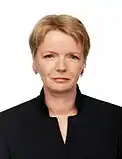2002 German federal election
The 2002 German federal election was held on 22 September 2002 to elect the members of the 15th Bundestag. Incumbent Chancellor Gerhard Schröder's centre-left "red-green" governing coalition retained a narrow majority, although the SPD retained their status as the largest party in the Bundestag.
| ||||||||||||||||||||||||||||||||||||||||||||||||||||||||||||||||||||||||||||||||||
All 603 seats in the Bundestag 302 seats needed for a majority | ||||||||||||||||||||||||||||||||||||||||||||||||||||||||||||||||||||||||||||||||||
|---|---|---|---|---|---|---|---|---|---|---|---|---|---|---|---|---|---|---|---|---|---|---|---|---|---|---|---|---|---|---|---|---|---|---|---|---|---|---|---|---|---|---|---|---|---|---|---|---|---|---|---|---|---|---|---|---|---|---|---|---|---|---|---|---|---|---|---|---|---|---|---|---|---|---|---|---|---|---|---|---|---|---|
| Registered | 61,432,868 | |||||||||||||||||||||||||||||||||||||||||||||||||||||||||||||||||||||||||||||||||
| Turnout | 48,582,761 (79.1%)[1] | |||||||||||||||||||||||||||||||||||||||||||||||||||||||||||||||||||||||||||||||||
| ||||||||||||||||||||||||||||||||||||||||||||||||||||||||||||||||||||||||||||||||||
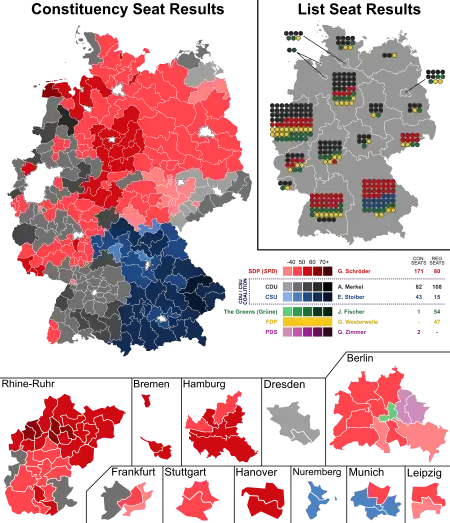 The left side shows constituency winners of the election by their party colours. The right side shows Party list winners of the election for the additional members by their party colours. | ||||||||||||||||||||||||||||||||||||||||||||||||||||||||||||||||||||||||||||||||||
| ||||||||||||||||||||||||||||||||||||||||||||||||||||||||||||||||||||||||||||||||||
Issues and campaign
Several issues dominated the campaign, with the opposition CDU/CSU attacking the government's performance on the economy which fell back into recession due to the Telecoms crash and the introduction of the euro, as well as campaigning on family values and against taxes (particularly on fuel). The SPD and Greens, on the other hand, were helped by broad support for its opposition to an invasion of Iraq, continued media attention on the CDU funding scandal and by Gerhard Schröder's personal popularity relative to the opposition's candidate for Chancellor, CSU leader Edmund Stoiber.
Early in the campaign, Guido Westerwelle, leader of the Free Democrats, declared himself a "Chancellor Candidate," usually a title reserved for the main election leaders of the SPD and CDU/CSU. This was met with general derision.
Results
Although most opposition parties gained seats, and the result was in doubt for most of the election night, the governing coalition retained a narrow majority. In particular, the SPD was able to partially offset declines in their vote share in the West with an increase in the East, with the PDS falling below both the 5% threshold and the 3-seat threshold, either of which is required to qualify a party for top-up seats. Consequently, the PDS held only two directly-elected seats.
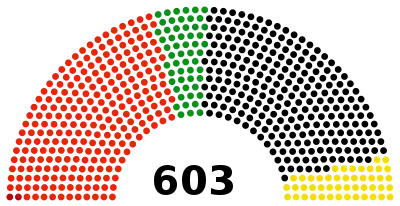 | ||||||||||||||||
| Parties | Constituency | Party list | Total seats | |||||||||||||
|---|---|---|---|---|---|---|---|---|---|---|---|---|---|---|---|---|
| Votes | % | +/− | Seats | +/− | Votes | % | +/− | Seats | +/− | Seats | +/− | % | ||||
| Social Democratic Party (SPD) | 20,059,967 | 41.9 | −1.9 | 171 | −41 | 18,488,668 | 38.5 | −2.4 | 80 | −6 | 251 | −47 | 41.6 | |||
| Christian Democratic Union (CDU) | 15,336,512 | 32.1 | −0.1 | 82 | +8 | 14,167,561 | 29.5 | +1.1 | 108 | −16 | 190 | −8 | 31.5 | |||
| Christian Social Union (CSU) | 4,311,178 | 9.0 | +1.7 | 43 | +5 | 4,315,080 | 9.0 | +2.2 | 15 | +6 | 58 | +11 | 9.6 | |||
| Alliance '90/The Greens | 2,693,794 | 5.6 | +0.6 | 1 | +1 | 4,110,355 | 8.6 | +1.9 | 54 | +7 | 55 | +8 | 9.1 | |||
| Free Democratic Party (FDP) | 2,752,796 | 5.8 | +2.8 | 0 | ±0 | 3,538,815 | 7.4 | +1.1 | 47 | +4 | 47 | +4 | 7.8 | |||
| Party of Democratic Socialism (PDS) | 2,079,203 | 4.3 | −0.6 | 2 | −2 | 1,916,702 | 4.0 | −1.1 | 0 | −32 | 2 | −34 | 0.3 | |||
| Party for a Rule of Law Offensive (Schill party) | 120,330 | 0.3 | +0.3 | 0 | ±0 | 400,476 | 0.8 | +0.8 | 0 | ±0 | 0 | ±0 | 0 | |||
| The Republicans (REP) | 55,947 | 0.1 | −0.5 | 0 | ±0 | 280,671 | 0.6 | −1.2 | 0 | ±0 | 0 | ±0 | 0 | |||
| National Democratic Party (NPD) | 103,209 | 0.2 | +0.1 | 0 | ±0 | 215,232 | 0.4 | +0.1 | 0 | ±0 | 0 | ±0 | 0 | |||
| Animal Protection Party | 8,858 | 0.0 | ±0 | 0 | ±0 | 159,655 | 0.3 | ±0 | 0 | ±0 | 0 | ±0 | 0 | |||
| The Grays – Gray Panthers (GRAUE) | 75,490 | 0.2 | −0.1 | 0 | ±0 | 114,224 | 0.2 | −0.1 | 0 | ±0 | 0 | ±0 | 0 | |||
| Party of Bible-abiding Christians (PBC) | 71,106 | 0.1 | ±0 | 0 | ±0 | 101,645 | 0.2 | +0.1 | 0 | ±0 | 0 | ±0 | 0 | |||
| Ecological Democratic Party (ödp) | 56,593 | 0.1 | −0.2 | 0 | ±0 | 56,898 | 0.1 | −0.1 | 0 | ±0 | 0 | ±0 | 0 | |||
| Feminist Party (DIE FRAUEN) | 2,264 | 0.0 | ±0 | 0 | ±0 | 36,832 | 0.1 | ±0 | 0 | ±0 | 0 | ±0 | 0 | |||
| Family Party (FAMILIE) | 15,138 | 0.0 | ±0 | 0 | ±0 | 30,045 | 0.1 | ±0 | 0 | ±0 | 0 | ±0 | 0 | |||
| Solidarity (BüSo) | 22,531 | 0.0 | ±0 | 0 | ±0 | 16,958 | 0.0 | ±0 | 0 | ±0 | 0 | ±0 | 0 | |||
| Christian Centre (CM) | 2,413 | 0.0 | ±0 | 0 | ±0 | 15,440 | 0.0 | ±0 | 0 | ±0 | 0 | ±0 | 0 | |||
| Bavaria Party (BP) | 6,757 | 0.0 | ±0 | 0 | ±0 | 9,379 | 0.0 | ±0 | 0 | ±0 | 0 | ±0 | 0 | |||
| Party for Pension Justice and Family (PRG) | 4,363 | 0.0 | +0.0 | 0 | ±0 | 7,499 | 0.0 | +0.0 | 0 | ±0 | 0 | ±0 | 0 | |||
| Departure for Civil Rights, Freedom and Health (AUFBRUCH) | 2,895 | 0.0 | +0.0 | 0 | ±0 | 4,697 | 0.0 | +0.0 | 0 | ±0 | 0 | ±0 | 0 | |||
| Centre Party (Zentrum) | 1,823 | 0.0 | ±0 | 0 | ±0 | 3,127 | 0.0 | +0.0 | 0 | ±0 | 0 | ±0 | 0 | |||
| Humanist Party (HP) | 1,385 | 0.0 | ±0 | 0 | ±0 | 2,485 | 0.0 | ±0 | 0 | ±0 | 0 | ±0 | 0 | |||
| The Violets (Violetten) | 840 | 0.0 | +0.0 | 0 | ±0 | 2,412 | 0.0 | +0.0 | 0 | ±0 | 0 | ±0 | 0 | |||
| Communist Party (KPD) | 686 | 0.0 | +0.0 | 0 | ±0 | 1,624 | 0.0 | +0.0 | 0 | ±0 | 0 | ±0 | 0 | |||
| German Social Union (DSU) | 6,003 | 0.0 | ±0 | 0 | ±0 | – | – | – | – | – | 0 | ±0 | 0 | |||
| German Communist Party (DKP) | 3,953 | 0.0 | ±0 | 0 | ±0 | – | – | – | – | – | 0 | ±0 | 0 | |||
| Freedom Party (FP Deutschlands) | 2,003 | 0.0 | ±0 | 0 | ±0 | – | – | – | – | – | 0 | ±0 | 0 | |||
| Alliance for Germany (Deutschland) | 571 | 0.0 | ±0 | 0 | ±0 | – | – | – | – | – | 0 | ±0 | 0 | |||
| Electoral groups and independents | 43,116 | 0.1 | ±0 | 0 | ±0 | – | – | – | – | – | 0 | ±0 | 0 | |||
| Invalid/blank votes | 741,037 | — | — | — | — | 586,281 | — | — | — | — | — | — | — | |||
| Totals | 48,582,761 | 100 | ±0.0 | 299 | –29 | 48,582,761 | 100 | ±0.0 | 304 | –37 | 603 | –66 | 100 | |||
| Registered voters/turnout | 61,432,868 | 79.1 | — | — | — | 61,432,868 | 79.1 | — | — | — | — | — | — | |||
| Source: Federal Returning Officer | ||||||||||||||||
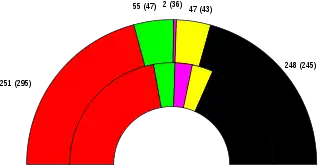
| 251 | 55 | 248 | 47 | |
| SPD | Grüne | CDU/CSU | FDP |
Post-election
The coalition between the SPD and the Greens continued in government with Gerhard Schröder as chancellor. However, due to the slim majority in the Bundestag, the governing coalition was not stable.
References
- "Voter turnout by election year". Website of the Federal Returning Officer's Office. The Federal Returning Officer. Archived from the original on 7 November 2014. Retrieved 7 November 2014.
Further reading
- Pulzer, Peter (April 2003). "The devil they know: The German federal election of 2002". West European Politics. 26 (2): 153–164. doi:10.1080/01402380512331341151.
Notes
- Stoiber was endorsed as the CDU/CSU's Chancellor candidate on 11 January 2002, while Angela Merkel remained as CDU leader. Stoiber had served as leader of the CSU since 9 October 1999.
- Stoiber was elected on the CSU's Bavaria list, but did not accept his mandate after the election.

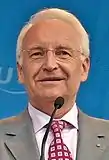
.jpg.webp)
.jpg.webp)
